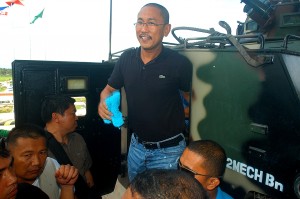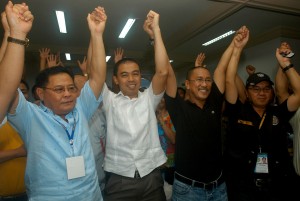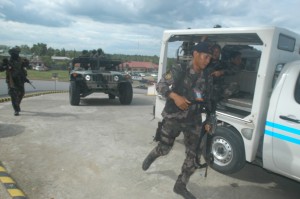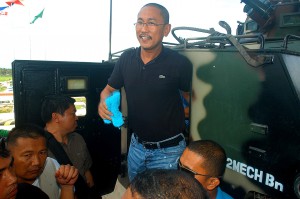By CAROLYN O. ARGUILLAS
Mindanews
(First of two parts)
 SHARIFF AGUAK, Maguindanao.—Esmael “Toto” Mangudadatu will take his oath of office as the new governor on June 30 and deliver his inaugural address in his hometown Buluan, 40 kilometers from the provincial capitol here.
SHARIFF AGUAK, Maguindanao.—Esmael “Toto” Mangudadatu will take his oath of office as the new governor on June 30 and deliver his inaugural address in his hometown Buluan, 40 kilometers from the provincial capitol here.
Mangudadatu intends to be far from this place, the bailiwick of the Ampatuans who are standing trial for the Nov. 23 massacre that left his wife Genalyn and 57 other civilians dead in what is now known as the worst case of pre-election violence in the country’s history.
The former Buluan vice mayor who beat the Ampatuans’ gubernatorial bet Datu Ombra Sinsuat in the May 10 elections intends to restore the provincial capitol in Simuay, Sultan Kudarat town, which the Ampatuans abandoned after the patriarch Andal Sr. was elected governor in 2001. While waiting for the old capitol to be restored, Mangudadatu will hold office in a building behind the Buluan town hall “for very important reasons,” he stressed.
The new governor is not taking chances with his safety. Although the May 10 elections in Maguindanao were peaceful and defied predictions it would again emerge as the hotbed of political violence on election day, uncertainty still grips the province which remains in a state of emergency.
 Fears for his security led Mangududatu to ride an Army Simba tank tailed by a convoy of security escorts from Buluan to the capitol, passing through the GenSan-Cotabato national highway, for his proclamation as governor-elect on May 14. Mangudadatu told reporters waiting at the capitol he took this unusual mode of transport on the advice of Army officers.
Fears for his security led Mangududatu to ride an Army Simba tank tailed by a convoy of security escorts from Buluan to the capitol, passing through the GenSan-Cotabato national highway, for his proclamation as governor-elect on May 14. Mangudadatu told reporters waiting at the capitol he took this unusual mode of transport on the advice of Army officers.
“For security purposes,” Mangudadatu said. “There were threats that bombs were placed along the highway and were set to explode when I passed.”
Not only is the provincial capitol right smack in the heartland of the Ampatuan clan’s turf, it is also just 400 meters away from the mansions of the patriarch, Ampatuan Sr., and his son, Autonomous Region in Muslim Mindanao Gov. Datu Zaldy Ampatuan.
Father and son and at least 10 other prominent members are implicated in the massacre. Six are detained in Bicutan: Ampatuan Sr.; Zaldy; Datu Andal Ampatuan Jr., mayor of Datu Unsay town; Datu Anwar, mayor of Shariff Aguak; Sajid, former vice governor and OIC governor; and the patriarch’s son-in-law, Datu Akmad M. Ampatuan, elected Mamasapano mayor in 2007 and appointed vice fovernor in January 2009. Six others are at large, including grandsons Saudi Jr., Bahnarin and Datu Anwar “Ipi” Ampatuan Jr.; Kanor Datumanong Ampatuan, Datu Mama Ampatuan and Datu Norodin Ampatuan.
The massacre generated national outrage. Maguindanao and Sultan Kudarat provinces and the city of Cotabato were placed under a state of emergency under Proclamation 1946 issued on Nov. 24, a day after the massacre, in a bid to “prevent and suppress the occurrence of similar other incidents of lawless violence.”
On Dec. 4, President Arroyo issued Proclamation 1959 declaring a state of martial law and suspending the privilege of the writ of habeas corpus in the province. Martial law was lifted on Dec. 12, but not the state of emergency.
By the time election period rolled around, all eyes were on Maguindanao, and election day was peaceful, for the first time in a long while.
“Not a single drop of blood was shed and no one was killed in Maguindanao (on election day). No watcher was hurt or abducted. There was some commotion in the polling precincts, but these were addressed fairly and squarely,” Mindanao-based journalist John Unson said in his remarks at a breakfast meeting at the 6th Infantry Division’s Camp Siongco in Datu Odin Sinsuat town on May 12, just two days after the election, held to celebrate the “generally peaceful” elections.
But authorities acknowledged that loyalists or “partisan armed groups” (more commonly known as “private armies”) of the Ampatuan clan remained a threat during the elections, even if they may have been dispersed from Shariff Aguak in the days following the Nov. 23 massacre.
Of the 698 election hotspots in the Eastern Mindanao Command’s (EastMinCom) area of responsibility, 300 were in Region 12, 168 of them in Maguindanao. Of five areas with 51 “partisan armed groups,” 42 were in Maguindanao with about 3,330 armed followers.
The EastMinCom also noted that the “presence of unidentified armed groups in isolated areas especially in the second district of Maguindanao causes apprehension which may affect the outcome of the elections.”
The Ampatuans’ turf is within the second district.
Although the Ampatuan patriarch lost his bid for vice governor, 10 other clan members implicated in the Nov. 23 massacre won in the elections.
“The hold of that man in traditional areas (was still) uncontested,” said Fr. Eliseo Mercado Jr., executive director of the Institute for Autonomy and Governance and former president of the Notre Dame University in Cotabato City, referring to Ampatuan Sr. who served as Maguindanao governor from 2001 to January 2009 and as acting governor just before the Nov. 23 massacre.
Ampatuan Jr. and Zaldy did not run for any elective post but fielded their wives. The rest, including the patriarch, filed their certificates of candidacy before the deadline on Dec. 1, just a week after the massacre.
When Mangudadatu announced he would run for governor, few people believed he would win. He only had five mayors out of Maguindanao’s 36 towns. But he linked up with the Masturas, a powerful clan that has control over a few but vote-rich towns.
In early December, Energy Undersecretary Zamzamin Ampatuan, the first nominee of a party-list group and a relative of the Ampatuans, expressed concern over the decision of the patriarch to run for vice governor and field a daughter as one of the opponents. The decision reached at a meeting of political leaders in Shariff Aguak after the massacre was for Sinsuat to run for governor and Datu Midpantao Midtimbang for vice governor as earlier agreed upon with the patriarch.
But at the last minute, Ampatuan Sr. decided to run for vice governor, prompting Midtimbang to run for governor. Mangudadatu won by a slight margin. He would have lost if Sinsuat’s and Midtimbang’s votes were combined. Ampatuan Sr. lost to Ismael “Dustin” Mastura by a huge margin.
 Mangudadatu and Mastura said they prefer to work in the old provincial capitol along the national highway in Sultan Kudarat town. For Mangudadatu, this would mean a 140-kilometer drive from Buluan passing through Makilala in North Cotabato then on to the Davao–Cotabato highway north to Sultan Kudarat.
Mangudadatu and Mastura said they prefer to work in the old provincial capitol along the national highway in Sultan Kudarat town. For Mangudadatu, this would mean a 140-kilometer drive from Buluan passing through Makilala in North Cotabato then on to the Davao–Cotabato highway north to Sultan Kudarat.
The Ampatuan patriarch held office in Simuay briefly, when he was first elected governor in 2001. But an alleged ambush on his convoy—critics call it a case of “ambush me”—triggered the transfer of the capitol to Shariff Aguak.
Where Mangudadatu and Mastura intend to hold office “is up to them,” said Brig. Gen. Ariel Bernardo, assistant commander of the Army’s 6th Infantry Division.
“They have other considerations, I am sure, other than security and safety factors but we can recommend of course, citing security as a paramount consideration. But whatever will be the decision, we should be ready to provide and fill in the gap to eliminate any degree of threat to them, together with the police of course,” he said.
Mangudadatu said he trusts the military because the personnel assigned in the province are new. “Wala silang pinapanigan (They’re not siding with anybody),” the governor-elect said.
Bernardo does not foresee the governor-elect being transported every day by a Simba tank but stressed there should be “proactive security measures. “Huwag namang sobra security detail. Yung tama lang and as required under the circumstances (There shouldn’t be an excess of security detail, just the right number required under the circumstances,” he said.
But Mangudadatu does not intend to ride the Simba to Shariff Aguak either. He has decided to govern from his hometown in Buluan while the old capitol is being repaired.
The old capitol in Sultan Kudarat is now rundown, with some parts of the building “cannibalized,” said the governor-elect.
Mastura said rehabilitation of the old capitol will take six months. He plans to temporarily hold office at the ABC Hall in Sultan Kudarat, his hometown.
What will happen to the provincial capitol in Shariff Aguak has yet to be decided. It could be converted into a hospital or the office of the Department of Education or Agriculture. “It depends,” said Mangudadatu.
Having the governor and vice governor holding office in their respective hometowns in the first six months of their three-year term might be problematic, but securing them every day in the Ampatuan stronghold right here would likely be a nightmare.
(MindaNews is the news service arm of a cooperative of Mindanao-based journalists.)
